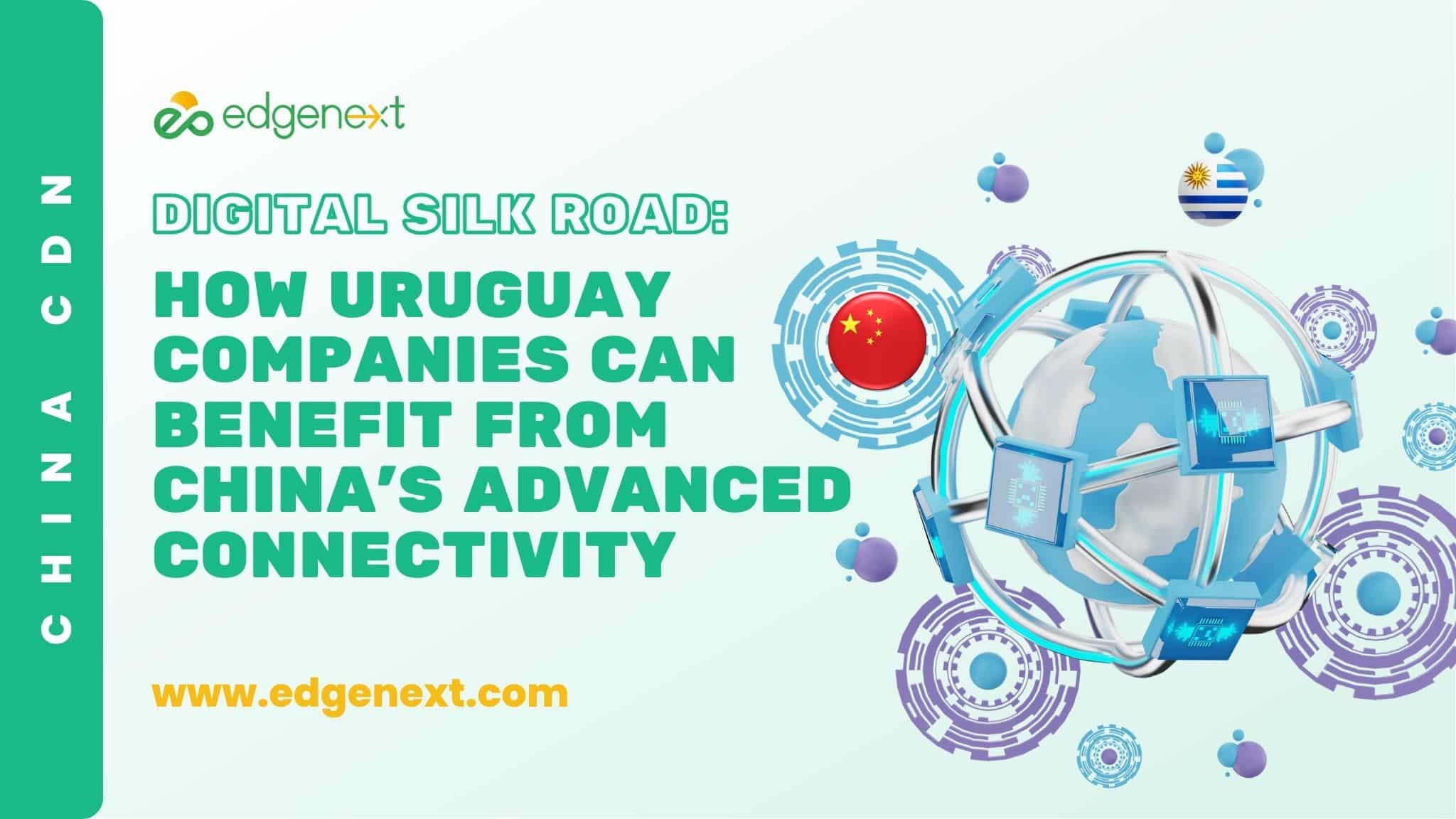
The Digital Silk Road is a critical component of China’s ambitious Belt and Road Initiative, connecting Asia, Europe, Africa, and Latin America through advanced digital infrastructure. As part of this initiative, Uruguay companies can benefit significantly from increased trade opportunities and streamlined supply chains with China and other global markets. In this document, we will explore the potential advantages for Uruguay companies in leveraging the Digital Silk Road and how it can impact their business operations. With China leading the way in advanced connectivity, Uruguay companies have a unique opportunity to tap into new markets and strengthen their global presence.
The Digital Silk Road is a modern-day adaptation of the historical Silk Road trade route, which connected China to Europe and beyond. Its main objective is to enhance global trade and economic cooperation through advanced digital infrastructure. This initiative includes the development of fiber-optic networks, 5G technology, satellite communications, e-commerce platforms, and other digital tools to improve connectivity between nations.
These advancements aim to create a more efficient and secure environment for international trade, benefiting both businesses and consumers. China’s advanced connectivity infrastructure includes the Belt and Road Information Network (BRIN) and the Asia-Pacific Information Superhighway. BRIN is a digital platform that provides information on trade policies, investment opportunities, and cultural exchanges between countries participating in the Belt and Road Initiative.
Uruguay and China have been strengthening their digital partnership in recent years by signing a Memorandum of Understanding on Digital Cooperation. This agreement promotes cooperation in e-commerce, telecommunications, and information technology. As a result, Uruguay companies have access to Chinese markets through major e-commerce platforms like Alibaba’s Tmall Global and JD Worldwide.
Chinese tech companies, such as Huawei and ZTE, have also invested in Uruguay’s digital infrastructure, providing opportunities for local businesses to adopt advanced technologies. This partnership allows Uruguay companies to collaborate with Chinese businesses on digital projects and explore new markets.
The Digital Silk Road provides Uruguay companies with a direct link to major Asian markets like China, Japan, and South Korea. This presents new opportunities for businesses to expand their reach and tap into the growing demand in these economies. By leveraging digital channels such as e-commerce platforms and online marketing, Uruguay companies can enter these markets without the traditional barriers of distance and language.
Furthermore, the Digital Silk Road also offers Uruguay companies access to other global markets, such as Europe and Africa. With improved digital connectivity, businesses can more easily establish supply chains and partnerships with these regions, increasing their worldwide presence and potential for growth.
The Digital Silk Road presents Uruguay companies with opportunities to adopt Chinese technological advancements and incorporate them into their operations. This technology transfer can bring significant benefits, such as increased efficiency and cost savings, for businesses in Uruguay.
Moreover, collaborative projects between China and Uruguay on digital initiatives can lead to innovation in Uruguay’s tech sector. By working together on research and development projects, both countries can learn from each other’s strengths and contribute to advancing technology in various industries.
China’s advanced connectivity infrastructure can greatly benefit Uruguay companies’ Asian digital presence. With improved access to Chinese markets and the use of advanced technologies, businesses in Uruguay can establish a stronger online presence and reach a larger consumer base.
Some examples of connectivity solutions that can benefit Uruguay companies include e-commerce platforms and payment systems that allow easy and secure transactions with Asian consumers. Additionally, Uruguay companies can benefit from using 5G technology for faster and more reliable communication with partners and customers in Asia. The Digital Silk Road presents numerous opportunities for enhanced connectivity solutions that can significantly improve the global presence of businesses in Uruguay. Overall, the Digital Silk Road is a game-changing initiative that offers countless opportunities for Uruguay companies to expand their reach.
Chinese e-commerce platforms like Tmall Global and JD Worldwide provide Uruguay companies with a direct channel to reach Chinese consumers. These platforms offer various tools and resources for businesses to establish their digital storefronts, including marketing and advertising features and customer service support.
However, logistics considerations are crucial for success on these platforms in addition to creating a strong online presence. Businesses must carefully plan and optimize their supply chains to ensure timely delivery of products to customers in China. This may involve working with local logistics partners or establishing warehouses in China. By implementing best practices for e-commerce operations on Chinese platforms, Uruguay companies can gain a competitive advantage and successfully tap into the growing market demand in Asia.

While the Digital Silk Road presents numerous opportunities, Uruguay companies may also face potential challenges. The language barrier and cultural differences can make it difficult to establish solid partnerships and understand market demands in Asian countries. Additionally, regulatory compliance and legal issues may vary from country to country, making it essential for businesses to thoroughly research and understand local laws before entering these markets.
To overcome these challenges and capitalize on the benefits of connectivity, businesses in Uruguay can employ strategies such as partnering with local firms or hiring native speakers to assist with communication. It is also essential for companies to conduct market research and adapt their strategy to fit cultural preferences and regulatory requirements in different countries. By being proactive and flexible, Uruguay companies can successfully navigate these challenges and take advantage of the opportunities presented by the Digital Silk Road.
As the Digital Silk Road continues to expand and evolve, it is expected to play an increasingly important role in global digital commerce. With China’s growing influence and investment in digital infrastructure, more opportunities will arise for collaboration and market access between countries along this route.
For Uruguay, this means a potential boost in economic and digital sector development. By leveraging the connectivity solutions and e-commerce opportunities presented by the Digital Silk Road, businesses in Uruguay can drive economic growth and increase their competitiveness in the global market. Additionally, technological advancements and digital initiatives through collaboration with China can lead to innovation and further development of Uruguay’s tech sector. The prospects of the Digital Silk Road are promising and will continue to shape the global digital landscape for years to come.
In conclusion, the Digital Silk Road presents numerous advantages for Uruguay companies looking to expand their global presence and tap into the growing market in Asia. Through improved connectivity solutions and access to e-commerce platforms, businesses can establish a strong digital presence and reach a larger consumer base. While there may be challenges along the way, proactive strategies and adaptation to cultural differences and regulatory requirements can help companies overcome these obstacles and fully embrace the opportunities presented by the Digital Silk Road.
To fully take advantage of the opportunities presented by the Digital Silk Road, Contact Edgenext today to learn more about how we can help your business thrive on the Digital Silk Road!
References:
· Chatzky, A., & McBride, J. (n.d.). China’s Massive Belt and Road Initiative. Council on Foreign Relations. Retrieved from https://www.cfr.org/china-digital-silk-road/
· National Geographic Kids. (n.d.). Uruguay. National Geographic Society. Retrieved from https://kids.nationalgeographic.com/geography/countries/article/uruguay
· State Council Information Office of the People’s Republic of China. (n.d.). [Title of the article in English or transliterated if not available]. Retrieved from http://www.scio.gov.cn/zfbps/zfbps_2279/202310/t20231010_773734.html

© 2025 EdgeNext Copyright All Right Reserved